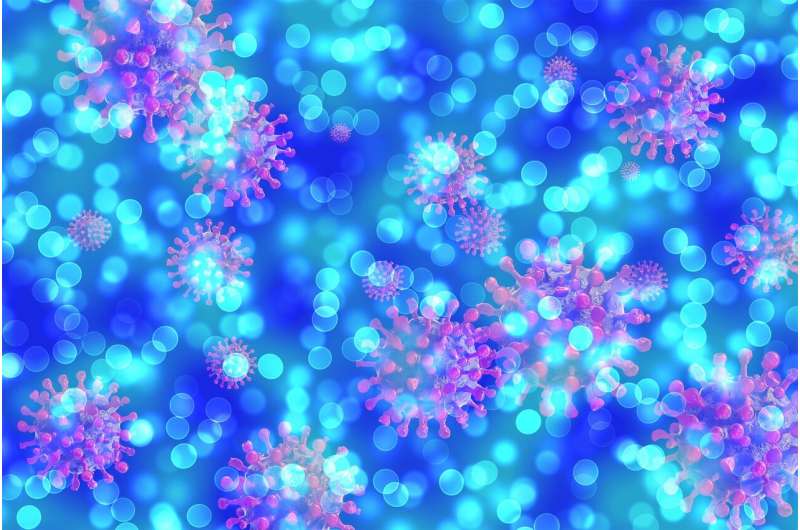This article has been reviewed according to Science X's editorial process and policies. Editors have highlighted the following attributes while ensuring the content's credibility:
fact-checked
trusted source
proofread
UK research highlights ongoing impact of COVID-19 on immunocompromised people

Research led by the University of Liverpool's Department of Politics launched today (Wednesday 6 December) has highlighted the ongoing impact of COVID-19 on more than a million immunocompromised people across the U.K.
A national survey conducted by the University of Liverpool and University of Bath in August 2023 revealed persistent, negative differences in health, finances, mental health, trust in politics and life satisfaction among immunocompromised people when compared with the general population.
During COVID-19, from March 2020, the U.K. government identified immunocompromised people as those who were "clinically extremely vulnerable." These people were advised to shield themselves, work from home, avoid contact with others, and ask others to do their shopping when possible.
More than three and a half years on from the onset of the pandemic, more than 1.2 million immunocompromised people have been identified as still at high risk, covering a wide spectrum of conditions and illnesses and across all ages. Due to their conditions and medications meaning the COVID vaccines for many in this group are ineffective, many are still either shielding or living restricted lives.
Together with the APPG on Vulnerable Groups to Pandemics, the Forgotten Lives UK patient group and the National Clinical expert group, the findings of survey data from 800 immunocompromised people will be launched in Parliament later today.
The research found that, in 2023, immunocompromised people report higher levels of worry about the impact of COVID-19 on their health and report higher rates of diagnosis of mental health conditions.
While immunocompromised people report higher levels of dissatisfaction with how the U.K. government handled the pandemic and with democracy, lower levels of trust in government and lower perception of representation compared with the general population, they also report higher levels of political participation in those forms that can be undertaken from home in comparison to the general public.
When asked what immunocompromised people considered to be the worst aspects of the pandemic, "loneliness" was top of the list closely followed by the "mental health impact."
Dr. Luca Bernardi from the University of Liverpool who led the research said, "Our findings reveal how, far from being a thing of the past, the anxiety caused by the COVID-19 pandemic is still very real for the many immunocompromised people across the U.K. The one of immunocompromised people constitutes an evident case of policy misrepresentation that has had important implications for political trust and satisfaction with democracy among this group.
"We hope that this research can now be used to raise awareness and develop policy interventions to improve the care and provision received by immunocompromised people."
Dr. Jo Daniels, Senior Lecturer in the Department of Psychology at the University of Bath said, "It is important that action is now taken to ensure that those who are shielding are appropriately provided for. It has been four years since the initial outbreak of COVID-19 and not enough has been done to support the most vulnerable in our society.
"Not only are they at risk due to their clinically vulnerable status, but they are affected across all areas of their lives, including their mental health. This cannot continue—more action is needed. We hope these recommendations and our call to action will go some way to igniting action from the government, serving as a reminder that for at least 1.2 million people, the threat of COVID-19 is not over. We must act now to prevent longer-term consequences."
Shielding patient family Mandy and Rob Boxall said, "Learning that like us, many shielders feel isolated and have either developed or compounded mental health issues, is sadly unsurprising, as we have an overwhelming sense of abandonment by the government. We've needed many sessions of counseling and therapists have been shocked that so many people are still having to live like this, with no support or mitigations in place. Knowing that after nearly four years we are being given a voice in parliament, gives a glimmer of hope that our situation might at last be addressed."
Bob Blackman MP, Chairman of the APPG on Groups Vulnerable to Pandemics said "Government has not taken action to recognize the impact of the pandemic and extensive shielding on this group and has no effective policy to protect them.
"Additionally, the bill to reform the Mental Health Act has been shelved despite Government promises made in its 2019 manifesto, failing patients more widely. It is imperative that planning around future treatments to protect the immunocompromised is prioritized and existing treatments made more accessible in order to liberate and protect the large numbers of people who remain marginalized and excluded from the economy, employment and social life."
More information: Survey: www.liverpool.ac.uk/media/liva … inal,APPG,report.pdf




















